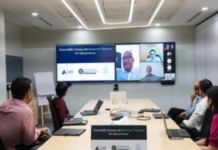New Delhi– The US Agency for International Development (USAID) and India’s Agriculture Ministry on Monday launched the second phase of the Feed the Future India Triangular Training Programme, bringing specialized agriculture training to 1,500 agricultural professionals across Africa and Asia.

US Ambassador Richard R. Verma and India’s Agriculture Secretary S.K. Pattanayak launched the program together at the National Agriculture Science Complex here.
“The programme builds upon five decades of joint work utilizing science and technology to bring innovative solutions to the challenges facing farmers,” an official release said.
Speaking on the occasion, Verma said: “Since the Green Revolution, India has made considerable progress in increasing its agricultural production, becoming one of the world’s largest producers of staple crops, fruits, horticulture, and dairy products.
“This increase has improved India’s food and nutritional security, and has helped reduce malnutrition rates of children three years and younger from 40 percent to 29 percent over the last 10 years.”
The training programme launching on Monday would enable “share these innovations worldwide, helping other countries revolutionize their agriculture practices and bringing solutions to aid farmers in their production, harvesting and marketing of goods”, Verma added.
“By harnessing the expertise and innovation of our two great countries, we are unlocking new opportunities to address global development challenges, bringing us closer to our shared objective of eliminating global poverty and hunger,” the envoy said.
The Programme will enable India and the US to share these farming techniques worldwide, helping countries in Africa and Asia revolutionise their agriculture practices and ultimately, improve global nutrition levels.
Led by India’s premier National Institute of Agricultural Extension Management, it will train 1,500 agricultural professionals from 17 countries across Africa and Asia on specialized practices that can improve food security and nutrition.
The first phase trained more than 200 professionals from Kenya, Liberia and Malawi. These professionals have empowered thousands of farmers, who have successfully adopted and are now implementing new and improved farming practices that are increasing their productivity and income, the statement said.






